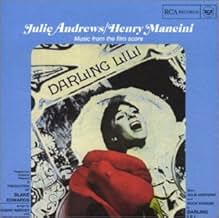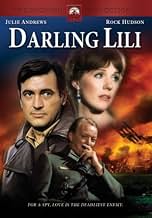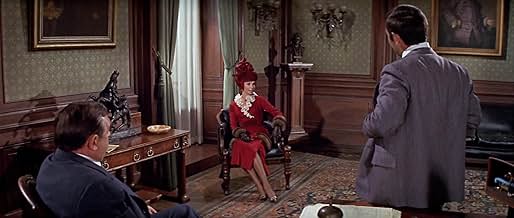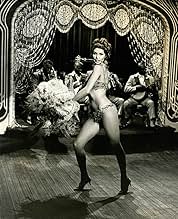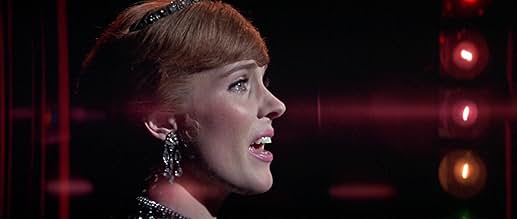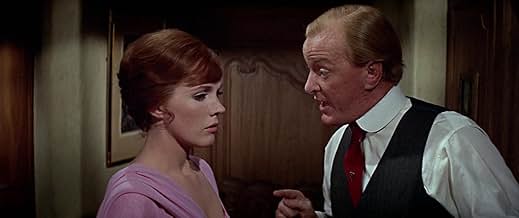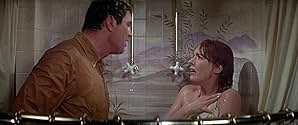IMDb RATING
6.1/10
2.6K
YOUR RATING
Set during World War I, this movie is a cute spin on the Mata Hari legend.Set during World War I, this movie is a cute spin on the Mata Hari legend.Set during World War I, this movie is a cute spin on the Mata Hari legend.
- Director
- Writers
- Stars
- Nominated for 3 Oscars
- 1 win & 7 nominations total
Arthur Gould-Porter
- Sergeant Wells
- (as A.E. Gould-Porter)
David Armstrong
- Squadron Pilot
- (uncredited)
Yves Barsacq
- French General
- (uncredited)
- Director
- Writers
- All cast & crew
- Production, box office & more at IMDbPro
6.12.6K
1
2
3
4
5
6
7
8
9
10
Featured reviews
A FAIRLY GOOD FILM IN THE DIRECTOR'S CUT
Blake Edwards' "Darling Lili" is not a great film, but it is better than most people give it credit for. One of the most maligned productions in history (the aerial sequences took 2 years to film, the budget swelled to 3 times the original budget, various cuts of the film only add to the muddle), my final analysis is this: an underrated film whose reputation should soar once it's more widely seen.
This film exists in three versions: the original roadshow version (190 minutes)which Edwards disowned, the general release version (136 minutes)and Edwards' personal director's cut (113 minutes).
Tones shift between versions. The roadshow version had more talky sequences and was a numbing bore. The general release version deleted these sequences and was an improvement, but was still missing something. Edwards' cut was a great improvement. It is more serious in tone than the previous cuts, but the story concucted by Edwards and William Peter Blatty benefits from that approach. Julie Andrews is simply great as Lili, the singer/spy and her singing is at an all time high. Rock Hudson is excellent as her American pilot lover. Only after his inclination was exposed, did people take him seriously as an actor. But he was great all along. The songs by Henry Mancini and Johnny Mercer are strong as is the cinematography (by Russell Harlan, in Panavision)
Sadly, "Darling Lili" is not available on tape or DVD. But luckily for us, AMC shows this very often.
Roadshow version: 1/2* General Release: ** 1/2 Director's Cut: ***1/2
This film exists in three versions: the original roadshow version (190 minutes)which Edwards disowned, the general release version (136 minutes)and Edwards' personal director's cut (113 minutes).
Tones shift between versions. The roadshow version had more talky sequences and was a numbing bore. The general release version deleted these sequences and was an improvement, but was still missing something. Edwards' cut was a great improvement. It is more serious in tone than the previous cuts, but the story concucted by Edwards and William Peter Blatty benefits from that approach. Julie Andrews is simply great as Lili, the singer/spy and her singing is at an all time high. Rock Hudson is excellent as her American pilot lover. Only after his inclination was exposed, did people take him seriously as an actor. But he was great all along. The songs by Henry Mancini and Johnny Mercer are strong as is the cinematography (by Russell Harlan, in Panavision)
Sadly, "Darling Lili" is not available on tape or DVD. But luckily for us, AMC shows this very often.
Roadshow version: 1/2* General Release: ** 1/2 Director's Cut: ***1/2
Sadly under-appreciated, Darling Lili is a charming spy operetta
I remember seeing DARLING LILI when it ran it's short original theatrical release. I also remember being the only person in the theatre during the particular showing I attended. It saddens me now as it did then that this beautifully crafted and delightful film was so sneered at and snubbed by critics and audiences alike. Movie musicals made a brief comeback in the early sixties and peaked with THE SOUND OF MUSIC in 1965. Hollywood continued to make them and even though two of them, OLIVER! and FUNNY GIRL, were mildly successful, the genre was again on the decline. The movie musicals of the late 60s all died at the box office including DOCTOR DOLITTLE, CAMELOT, FINIAN'S RAINBOW, GOODBYE MR. CHIPS, CHITTY CHITTY BANG BANG, PAINT YOUR WAGON, HALF A SIXPENCE, SWEET CHARITY, HELLO DOLLY! as well as Andrews' other underrated drama with music, STAR! which I consider a companion piece to both DARLING LILI and Andrews' comeback film, VICTOR,VICTORIA. But even in 1970 the movie musical struggled to survive with not only DARLING LILI but two other large scale musical extravaganzas, ie: ON A CLEAR DAY YOU CAN SEE FOREVER and SCROOGE. Much salt was added to the wound when not only 'LILI' but also 'CLEAR DAY' and SCROOGE tanked at the box office. These films failed not because they were bad films but because audiences had grown cynical and no film was any good unless it was "realistic". It seemed that going to the movies was no longer an excercise in temporarily putting one's troubles aside for a few hours of nurturing the spirit and soul with beautiful singing and dancing. Critics and audiences seemed to have taken themselves so seriously that even their entertainment had to be a reflection of their harsh day to day realities. One was labeled old fashioned and unhip to enjoy movie musicals. As for DARLING LILI, I found this delightful comedy farce with music to be truly charming and funny. Julie Andrews is in top form both musically and dramatically. Not only that but her comic talents are equally displayed. She looks gorgeous in this film and like STAR! she dazzles us in her canny ability to retain her girl next door demeanor and be damn sexy at the same time. Of course her success in keeping the balance of wholesomeness and sexy seductiveness is in part due to the excellent directing of her director/husband Blake Edwards. Again, the movie's failure at the box office is due the audiences' inability to appreciate what Edwards was trying to do. They just plain didn't get it. Nor did the critics have a clue either. Edward's clever variation on the Mata Hari story mixing musical numbers and intrigue and farce and romance with World War 1 the backdrop should have been embraced by the public during the Vietnam years as a bit of reprieve and relief from all the turmoil of the times; not as a way to forget the harsh realities but to make them easier to cope with. But this was not to be. I sometimes wonder if this movie would be better received if it was being released now for the first time.
Besides the highly entertaining adventure comedy, the music is gorgeous. Ms. Andrews sings one of the finest songs of the period, the haunting "Whistling Away the Dark" which was tragically robbed of the Best Song Oscar for 1970. But all the songs are great written by Henry Mancini. The sumptuous sets, art direction and costumes frame the movie with grand artistic opulence. Rock Hudson is great as an American fighter pilot and he revives his suave, debonair dash reminiscent of his farcical bedroom comedies with Doris Day.
For several years now I have longed for Mr. Edwards to release a widescreen letterbox video release on DVD. To my knowledge there has never been home video version. I'm willing to bet that the DVD would do well in sales. Edwards could even do a Julie Andrews commemorative box set of DARLING LILI and VICTOR VICTORIA in gorgeous letterboxed DVD transfers with all the fancy extra features. Well, one can dream. If I knew how to contact Mr. Edwards and Ms. Andrews I'd write them a letter begging them to make DARLING LILI available. Heck, I'd grovel if necessary. I'd love to tell everyone to go out and rent this wonderful movie but I can't since it's not available. The only way one can see this film is when it's broadcast on cable - which I don't have. And even then it's not always shown in it's widescreen splendor. Often one is subjected to cable broadcasts of the film in the horrific pan and scan format which sadly upstages and obstructs the artistic integrity of the film. If I were Julie Andrews or Blake Edwards, I would want to share this lovely work of art on film in the very best venue possible: DVD home video in widescreen. So far, all we are allowed is an occasional glimpse of this little gem often crippled by pan and scan butchery via cable, a source slowly dying off with the emergence of Direct TV and the growing popularity of DVDs and DVD players.
Besides the highly entertaining adventure comedy, the music is gorgeous. Ms. Andrews sings one of the finest songs of the period, the haunting "Whistling Away the Dark" which was tragically robbed of the Best Song Oscar for 1970. But all the songs are great written by Henry Mancini. The sumptuous sets, art direction and costumes frame the movie with grand artistic opulence. Rock Hudson is great as an American fighter pilot and he revives his suave, debonair dash reminiscent of his farcical bedroom comedies with Doris Day.
For several years now I have longed for Mr. Edwards to release a widescreen letterbox video release on DVD. To my knowledge there has never been home video version. I'm willing to bet that the DVD would do well in sales. Edwards could even do a Julie Andrews commemorative box set of DARLING LILI and VICTOR VICTORIA in gorgeous letterboxed DVD transfers with all the fancy extra features. Well, one can dream. If I knew how to contact Mr. Edwards and Ms. Andrews I'd write them a letter begging them to make DARLING LILI available. Heck, I'd grovel if necessary. I'd love to tell everyone to go out and rent this wonderful movie but I can't since it's not available. The only way one can see this film is when it's broadcast on cable - which I don't have. And even then it's not always shown in it's widescreen splendor. Often one is subjected to cable broadcasts of the film in the horrific pan and scan format which sadly upstages and obstructs the artistic integrity of the film. If I were Julie Andrews or Blake Edwards, I would want to share this lovely work of art on film in the very best venue possible: DVD home video in widescreen. So far, all we are allowed is an occasional glimpse of this little gem often crippled by pan and scan butchery via cable, a source slowly dying off with the emergence of Direct TV and the growing popularity of DVDs and DVD players.
Full Market Value Musical
Recognized with three Oscar nominations Darling Lili was a big flop at the time and helped seal the fate of big budget musicals and Julie Andrews's career in them. They were getting just too expensive to make with all the talent that used to be under contract to a studio now charging full market value for services. Whatever else Darling Lili is it's a full market value musical film.
Set in the era of World War I, Darling Lili's best asset is its music. Two of the three nominations were in the music field for best overall score and to Henry Mancini and Johnny Mercer for the song Whistling In The Dark. That one is an incredibly beautiful number that Julie Andrews sings perfectly. The original songs are integrated so well into the film that they fit perfectly in the era. More traditional World War I era songs are also used, no doubt all in the public domain by 1970.
Would that the score was attached to a better story. Wholesome Julie Andrews is a popular entertainer of the era, singing for the troops on the western front. She also doubles as a German spy. Her assignment which she accepts with gusto is to get involved with American air ace Rock Hudson and learn some military secrets. I think you can guess the rest.
Darling Lili lurches back and forth from cloak and dagger espionage to slapstick comedy in the extreme and it's an uncomfortable ride in the process. One of the characters is Lance Percival playing a drunken pilot in the Royal Flying Corps. I mean really, this guy should never have been in the RFC, the comedy which is good is severely out of place.
Film buffs will recognize some similarity to The Firefly and the British classic Dark Journey so if you know those films you know how this one ends. Fans of Rock Hudson and of Julie Andrews will like this and her singing is divine. The rest of Darling Lili is on a lesser plain.
Set in the era of World War I, Darling Lili's best asset is its music. Two of the three nominations were in the music field for best overall score and to Henry Mancini and Johnny Mercer for the song Whistling In The Dark. That one is an incredibly beautiful number that Julie Andrews sings perfectly. The original songs are integrated so well into the film that they fit perfectly in the era. More traditional World War I era songs are also used, no doubt all in the public domain by 1970.
Would that the score was attached to a better story. Wholesome Julie Andrews is a popular entertainer of the era, singing for the troops on the western front. She also doubles as a German spy. Her assignment which she accepts with gusto is to get involved with American air ace Rock Hudson and learn some military secrets. I think you can guess the rest.
Darling Lili lurches back and forth from cloak and dagger espionage to slapstick comedy in the extreme and it's an uncomfortable ride in the process. One of the characters is Lance Percival playing a drunken pilot in the Royal Flying Corps. I mean really, this guy should never have been in the RFC, the comedy which is good is severely out of place.
Film buffs will recognize some similarity to The Firefly and the British classic Dark Journey so if you know those films you know how this one ends. Fans of Rock Hudson and of Julie Andrews will like this and her singing is divine. The rest of Darling Lili is on a lesser plain.
Stylish, Lovely and Moving; Satire With Comedy, Infectious Sense-of-Life
I suppose I like this film as well as any I know; it is not perfect, but under the title "The Americanization of Lily" this charming and memorable semi-musical satire might I suggest have been appreciated more, and still loved by those who recognized its special Blake Edwards'-produced spirit of gentleness, clever humor and solid narrative. The improbably but delightful story-line follows Lili Smith, a fringe-type spy for the Germans in a much simpler and less black-and-white war; Lili Schmidt passing as Smith is helping her Uncle who is patriotic too, for Germany but neither cruel nor political, merely opportunistic. Lili's target is William Larrabee, a charismatic U.S. squadron leader who can supply her valuable information. The plot thickens comes when Lili falls in love with Larrabee, has her eyes opened to the consequences of her playing spy, and sees the effects of combat on wounded men at a hospital and realizes what it might mean to his men whom she has met and likes. She gets jealous of a rival for Larrabee's affections, then realizes she can no longer do what she has been doing and gives up the spy business. The logical end of the film comes when after the terrible WWI has ended, as she sings the theme song of the film, "Wishing" in a darkened theater, one by one the members of Larrabee's squadron appear, including her lover himself, indicating they have forgiven her and their former opponents; and even Uncle Kurt enthusiastically joins in the singing of "It's a Long To Tipperraree", to indicate all is well with the world again. This is an audacious and sometime brilliant story idea, written by director Blake Edwards and William Peter Blatty of "John Goldfarb" fame; and it is a delightful narrative. Larrabee's squadron, including an inebriate who keeps crashing and other lovable types populate this lively film; and the feel of this stylish and glowing film is almost epic, both in its scope and realization. Credit must go to Jack Bear and Donald Brooks for their costume creations, Reg Allen and Jack Stevens for sets, Fernando Carrere for another beautiful production design, Henry Mancini for his sensitive and appropriate musical score, and to Russell Harlan for his shining cinematography. In the beautiful footage, the principal actors are Julie Andrews as Lili, Rock Hudson as Larrabee, Keremy Kemp outstanding as Lili's Uncle Kurt, Michael Witney, Lance Percival as the inebriate pilot, gorgeous Gloria Paul as Lili's stripteasing rival, and many other fine actors in smaller parts. It is hard to say enough nice things about the pace, or the cleverness of the just-this-side-of broad comedy; this element is introduced by Edwards to leaven the horrors of actual warfare, to example the almost comic-opera approach with which men made war back in a more innocent-minded era of human civilization.. This comedy also helps prepare the way for Lili's conversion from uncritical acceptance of a duty to the German state to acceptance of the reality of what she is doing and potentially what she may be causing. This is a rare "sense-of-life" film about Lili's "Americanization", her assertion of herself in the real world and then among others before tragedy can happen. It is haunting, I find, and beautiful in many ways. I consider it to be Blake Edwards'masterpiece of directing; and under the title "The Americanization of Lili" I believe with hardly any changes it might have been recognized as the polished sapphire of a film it is by every standard I know.
Funny and flirty
In an odd, comic take on Mata Hari's legendary fame, Julie Andrews stars as a well-loved British entertainer who seduces military leaders and passes on their secrets to the Germans. This movie doesn't take itself too seriously, so feel free to just tap your toe and enjoy Julie's fun musical numbers. It's also a Blake Edwards movie, so you can expect to be entertained by quick comedy and superb comic timing. In a famous scene, Rock Hudson gets so mad, he barges in on Julie Andrews in the shower to continue their argument.
In one of my favorite scenes, Julie has been tasked with delaying Rock at her house. She puts on a large act of seduction, but in order to stretch things out, she insists on getting literally swept off her feet. Rock struggles to pick her up and carry her through the rooms, since she continues to kiss him and pretends to be so engrossed in her task she doesn't know he's having trouble. It's pretty funny, as is much of the movie. The very best scene, though, is hands down the striptease. Julie gets jealous of Rock's other paramour Gloria Paul. Gloria's a stripper, and Julie watches a risqué dance, then recreates it onstage in her next performance! You won't be able to believe it until you see it: Julie Andrews bumping, grinding, and taking her dress off. I thought it was fantastic, and it almost earned her a Hot Toasty Rag nomination; but there were lots of heavy, dramatic performances that year and she didn't make it on the list.
You'll get to hear lots of fun songs that put you back in the wartime mood, and Henry Mancini's Oscar- and Rag-nominated "Whistling in the Dark" opens the film. And with two pretty people in the leads, and lots of smooching, you're in for an enjoyable, funny evening.
In one of my favorite scenes, Julie has been tasked with delaying Rock at her house. She puts on a large act of seduction, but in order to stretch things out, she insists on getting literally swept off her feet. Rock struggles to pick her up and carry her through the rooms, since she continues to kiss him and pretends to be so engrossed in her task she doesn't know he's having trouble. It's pretty funny, as is much of the movie. The very best scene, though, is hands down the striptease. Julie gets jealous of Rock's other paramour Gloria Paul. Gloria's a stripper, and Julie watches a risqué dance, then recreates it onstage in her next performance! You won't be able to believe it until you see it: Julie Andrews bumping, grinding, and taking her dress off. I thought it was fantastic, and it almost earned her a Hot Toasty Rag nomination; but there were lots of heavy, dramatic performances that year and she didn't make it on the list.
You'll get to hear lots of fun songs that put you back in the wartime mood, and Henry Mancini's Oscar- and Rag-nominated "Whistling in the Dark" opens the film. And with two pretty people in the leads, and lots of smooching, you're in for an enjoyable, funny evening.
Did you know
- TriviaA very troubled production, this movie went way over budget and was a box-office flop when released. Director Blake Edwards used the experience of making this movie as the inspiration for the script to S.O.B. (1981).
- GoofsIn the "Cafe Can Can" scene the World War I American pilots are said to belong to an "Eagle Squadron" but that term was only used for Americans flying with the RAF in World War II.
- Quotes
Lili Smith: But then, why *does* he drink?
Maj. William Larrabee: Because he's afraid to fly.
Lili Smith: Then why does he fly?
Maj. William Larrabee: Because he likes to drink!
- Crazy creditsThe Paramount Pictures logo does not appear in the beginning of the film, only at the end of the film.
- Alternate versionsTwo decades after its original release, director Blake Edwards re-cut the film for the TNT network, shortening it by 22 minutes and dramatically changing its tone. This so-called "director's cut" runs 114 minutes.
- ConnectionsFeatured in Entertainment This Week Salutes Paramount's 75th Anniversary (1987)
- SoundtracksLa Marseillaise
by Claude Joseph Rouget de Lisle
Special French Lyrics Translations by Danielle Mauroy and Michel Legrand
- How long is Darling Lili?Powered by Alexa
Details
- Release date
- Country of origin
- Languages
- Also known as
- Darling Lili: Or Where Were You the Night You Said You Shot Down Baron von Richtofen
- Filming locations
- Production company
- See more company credits at IMDbPro
Box office
- Budget
- $25,000,000 (estimated)
- Runtime
- 2h 16m(136 min)
- Aspect ratio
- 2.35 : 1
Contribute to this page
Suggest an edit or add missing content


